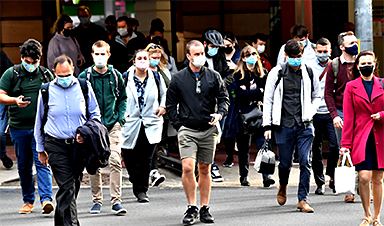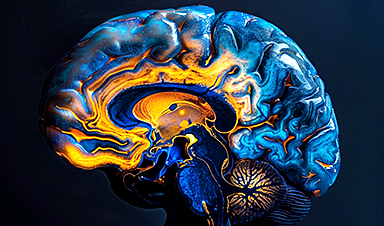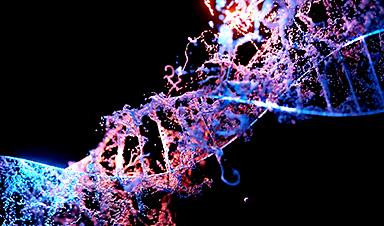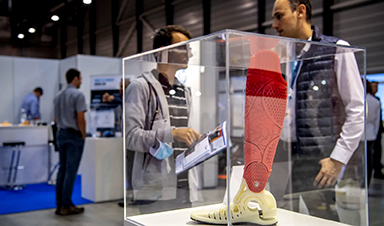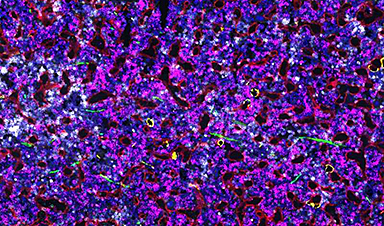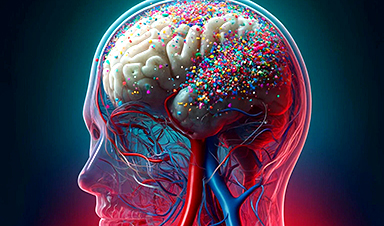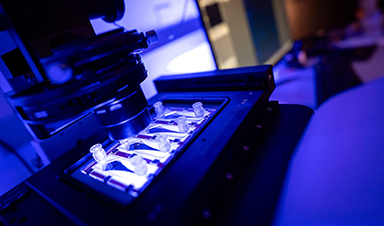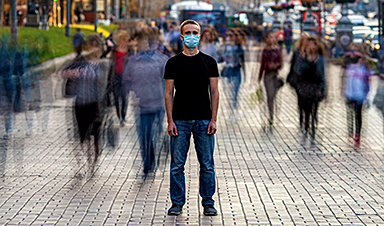A new study from Columbia researchers, in collaboration with scientists at the University of Hong Kong, adds more evidence that the omicron variant can evade the immune protection conferred by vaccines and natural infection and suggests the need for new vaccines and treatments that anticipate how the virus may soon evolve.
A striking feature of the omicron variant is the alarming number of changes in the virus’s spike protein that could pose a threat to the effectiveness of current vaccines and therapeutic antibodies.
Large drop in Omicron neutralization by antibodies from vaccines
The new study tested the ability of antibodies generated by vaccination to neutralize the omicron variant in laboratory assays that pitted antibodies against live viruses and against pseudoviruses constructed in the lab to mimic omicron.
Antibodies from people double-vaccinated with any of the four most widely used vaccines—Moderna, Pfizer, AstraZeneca, Johnson & Johnson—were significantly less effective at neutralizing the omicron variant compared to the ancestral virus. Antibodies from previously infected individuals were even less likely to neutralize omicron.
Individuals who received a booster shot of either of the two mRNA vaccines are likely to be better protected, although even their antibodies exhibited diminished neutralizing activity against omicron.
“The new results suggest that previously infected individuals and fully vaccinated individuals are at risk for infection with the omicron variant,” says Ho. “Even a third booster shot may not adequately protect against omicron infection, but of course it is advisable to get one, as you’ll still benefit from some immunity.”
The results are consistent with other neutralization studies, as well as early epidemiological data from South Africa and the U.K., which show efficacy of two doses of the vaccines against symptomatic disease is significantly reduced against the omicron variant.
Most monoclonal antibodies are unable to neutralize Omicron
When administered early in the course of infection, monoclonal antibodies can prevent many individuals from developing severe COVID. But the new study suggests that all of the therapies currently in use and most in development are much less effective against omicron, if they work at all.
In neutralization studies with monoclonal antibodies, only one (Brii198 approved in China) maintained notable activity against omicron. A minor form of omicron is completely resistant to all antibodies in clinical use today. The authors note that omicron is now the most complete “escapee” from neutralization that scientists have seen.
In this study Ho’s lab also identified four new spike mutations in omicron that help the virus evade antibodies. This information should inform the design of new approaches to combat the new variant.
Future directions
Ho suggests that scientists will need to develop vaccines and treatments that can better anticipate how the virus is evolving.
“It is not too far-fetched to think that SARS-CoV-2 is now only a mutation or two away from being completely resistant to current antibodies, either the monoclonal antibodies used as therapies or the antibodies generated by vaccination or infection with previous variants,” says Ho.
News
Challenging Previous Beliefs: Japanese Scientists Discover Hidden Protector of Heart
A Japanese research team found that the oxidized form of glutathione (GSSG) may protect heart tissue by modifying a key protein, potentially offering a novel therapeutic approach for ischemic heart failure. A new study [...]
Millions May Have Long COVID – So Why Can’t They Get Diagnosed?
Millions of people in England may be living with Long Covid without even realizing it. A large-scale analysis found that nearly 10% suspect they might have the condition but remain uncertain, often due to [...]
Researchers Reveal What Happens to Your Brain When You Don’t Get Enough Sleep
What if poor sleep was doing more than just making you tired? Researchers have discovered that disrupted sleep in older adults interferes with the brain’s ability to clean out waste, leading to memory problems [...]
How to prevent chronic inflammation from zombie-like cells that accumulate with age
In humans and other multicellular organisms, cells multiply. This defining feature allows embryos to grow into adulthood, and enables the healing of the many bumps, bruises and scrapes along the way. Certain factors can [...]
Breakthrough for long Covid patients who lost sense of smell
A breakthrough nasal surgery has restored the sense of smell for a dozen long Covid patients. Experts at University College London Hospitals NHS Foundation Trust successfully employed a technique typically used for correcting blocked nasal passages, [...]
Scientists Invent Plastic That Can Dissolve In Seawater In Just A Few Hours
Plastic waste and pollution in the sea have been among the most serious environmental problems for decades, causing immense damage to marine life and ecosystems. However, a breakthrough discovery may offer a game-changing solution. [...]
Muscles from the 3D printer
Swiss researchers have developed a method for printing artificial muscles out of silicone. In the future, these could be used on both humans and robots. Swiss researchers have succeeded in printing artificial muscles out [...]
Beneficial genetic changes observed in regular blood donors
Researchers at the Francis Crick Institute have identified genetic changes in blood stem cells from frequent blood donors that support the production of new, non-cancerous cells. Understanding the differences in the mutations that accumulate [...]
Shocking Amounts of Microplastics in the Brain – It Could Be Increasing Our Risk of Dementia
The brain has higher concentrations of plastic particles compared to other organs, with increased levels found in dementia patients. In a comprehensive commentary published in Brain Medicine, researchers highlight alarming new evidence of microplastic accumulation [...]
Baffling Scientists for Centuries: New Study Unravels Mystery of Static Electricity
ISTA physicists demonstrate that contact electrification depends on the contact history of materials. For centuries, static electricity has intrigued and perplexed scientists. Now, researchers from the Waitukaitis group at the Institute of Science and [...]
Tumor “Stickiness” – Scientists Develop Potential New Way To Predict Cancer’s Spread
UC San Diego researchers have developed a device that predicts breast cancer aggressiveness by measuring tumor cell adhesion. Weakly adherent cells indicate a higher risk of metastasis, especially in early-stage DCIS. This innovation could [...]
Scientists Just Watched Atoms Move for the First Time Using AI
Scientists have developed a groundbreaking AI-driven technique that reveals the hidden movements of nanoparticles, essential in materials science, pharmaceuticals, and electronics. By integrating artificial intelligence with electron microscopy, researchers can now visualize atomic-level changes that were [...]
Scientists Sound Alarm: “Safe” Antibiotic Has Led to an Almost Untreatable Superbug
A recent study reveals that an antibiotic used for liver disease patients may increase their risk of contracting a dangerous superbug. An international team of researchers has discovered that rifaximin, a commonly prescribed antibiotic [...]
Scientists Discover Natural Compound That Stops Cancer Progression
A discovery led by OHSU was made possible by years of study conducted by University of Portland undergraduates. Scientists have discovered a natural compound that can halt a key process involved in the progression [...]
Scientists Just Discovered an RNA That Repairs DNA Damage – And It’s a Game-Changer
Our DNA is constantly under threat — from cell division errors to external factors like sunlight and smoking. Fortunately, cells have intricate repair mechanisms to counteract this damage. Scientists have uncovered a surprising role played by [...]
What Scientists Just Discovered About COVID-19’s Hidden Death Toll
COVID-19 didn’t just claim lives directly—it reshaped mortality patterns worldwide. A major international study found that life expectancy plummeted across most of the 24 analyzed countries, with additional deaths from cardiovascular disease, substance abuse, and mental [...]
